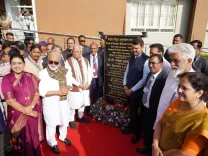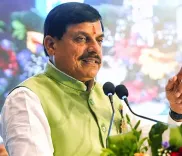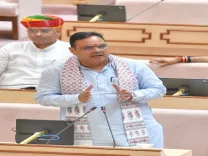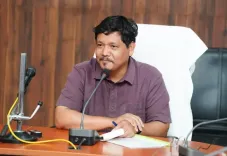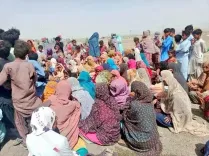Congress Celebrates Sardar Patel’s Legacy in Ahmedabad, Outlines New Ideological Vision

Synopsis
Key Takeaways
- Resolution adopted at the Sabarmati River reflects national revival.
- Focus on reclaiming Sardar Patel's legacy against distortion.
- Emphasis on secularism, pluralism, and economic justice.
- Patel portrayed as a Gandhian leader, not an authoritarian figure.
- Call to protect constitutional values and promote unity.
Ahmedabad, April 8 (NationPress) During the celebration of the 150th birth anniversary of Sardar Vallabhbhai Patel, the Indian National Congress (INC) convened along the historic banks of the Sabarmati River in Ahmedabad to pass a resolution aimed at sparking a national revival steeped in the fundamental principles of the freedom movement.
The resolution, which was adopted on April 7, serves not only as a homage to Patel but also as a rallying cry to restore his legacy amidst what the party describes as a “distorted narrative” regarding India’s journey towards nationhood.
Entitled ‘Flag Bearer of Freedom Movement – Our Sardar – Sh. Vallabhbhai Patel’, the resolution reflected both a moment of reflection and a strong assertion.
The Congress reaffirmed its foundational principles of secularism, pluralism, and economic justice, while also striving to remind the country of Patel’s genuine contributions—not merely as the ‘Iron Man’ who unified India but also as a Gandhian who championed inclusive politics.
The party highlighted Patel’s leadership during the Kheda Satyagraha in 1918, where he opposed British taxation on farmers, drawing inspiration from Mahatma Gandhi’s philosophies.
It traced Patel’s path through the Bardoli Satyagraha of 1928 to his pivotal role in the integration of princely states post-Independence, portraying him not as a symbol of aggressive nationalism but as a link between Gandhi’s vision and Nehru’s implementation.
“There is a purposeful effort to detach Sardar Patel from his ideological origins. He was fundamentally a Gandhian, not the authoritarian figure as depicted by contemporary propaganda,” a senior Congress leader remarked during the Ahmedabad gathering.
The resolution emphasized the critical necessity of reclaiming the concept of India that is built upon dialogue, diversity, and democratic values. It accused the Union government of undermining constitutional institutions, polarizing the populace, and misappropriating freedom fighters for political purposes.
In contrast, the Congress pledged to intensify its ideological fight with a renewed focus on national unity and economic equity.
The choice of location for the resolution—the banks of Sabarmati—holds significant symbolism. It was from this very spot that Mahatma Gandhi initiated the ‘Salt March’, and here Congress aims to initiate what it calls a “struggle for India’s soul.”
By invoking Mahatma Gandhi, Pandit Nehru, and Sardar Patel together, the party aimed to reaffirm the collective vision that led India to independence and established the framework for its post-Independence journey.
Significantly, the resolution also addressed current socio-political challenges, cautioning against the degradation of federalism, the rise of communal politics, and the stifling of dissent.
The Congress asserted that true patriotism encompasses upholding constitutional morality, safeguarding the rights of every citizen, and embracing the nation’s pluralistic fabric.
The resolution from Ahmedabad could be viewed as a manifesto for ideological realignment—an endeavor to redirect the conversation back to the Republic's roots.
Whether this initiative succeeds in reorienting the political dialogue remains uncertain, but for now, the party has articulated its message clearly: reclaiming Sardar Patel is synonymous with reclaiming India itself.

